May 30, 2025 | 17:28 GMT +7
May 30, 2025 | 17:28 GMT +7
Hotline: 0913.378.918
May 30, 2025 | 17:28 GMT +7
Hotline: 0913.378.918
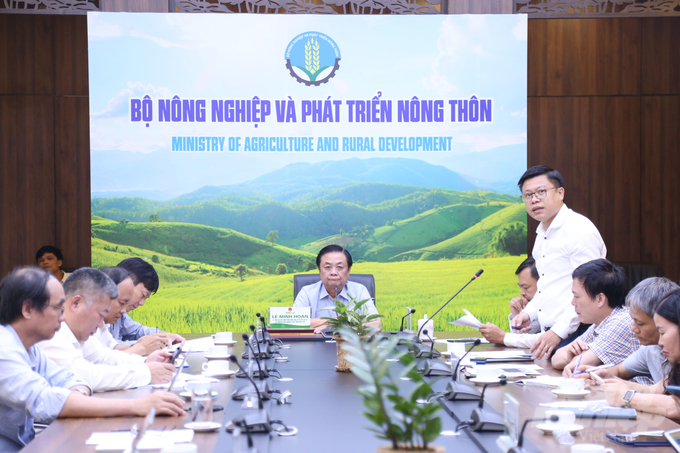
Minister Le Minh Hoan chairs a meeting on the results of digital transformation in the agricultural sector in the first nine months of 2023.
On October 10 afternoon,Minister Le Minh Hoan chairs a meeting on the results of digital transformation in the agricultural sector in the first nine months of 2023 from the standing agency of the Steering Committee for Digital Transformation in the agricultural sector (MARD). Deputy Minister Nguyen Hoang Hiep also attends, representing leaders of units under the Ministry.
Reporting at the Conference, the standing agency of the Digital Transformation Steering Committee says that in 2023, units under the Ministry has implemented the 53 goals of Digital Transformation according to Plan No. 5275/QD0BNN-VP of the Ministry, in which 43 tasks were completed.
The Ministry’s agricultural digital transformation fields include the following contents: Digital awareness, Digital institutions, Digital data, Digital platforms, Digital human resources, Cyber information security, Digital government, Economy Digital agriculture, and Digital infrastructure.
According to the independent assessment of the Ministry of Information and Communications in 2022, the digital transformation ranking of the MARD ranked 15/17 ministries and branches.
Digital awareness, which includes policy communication, has been deployed extensively on MARD’s information portal and Vietnam Agriculture Newspaper. From the third quarter onwards, units will have to pay more attention to digital awareness transformation to achieve the set tasks.
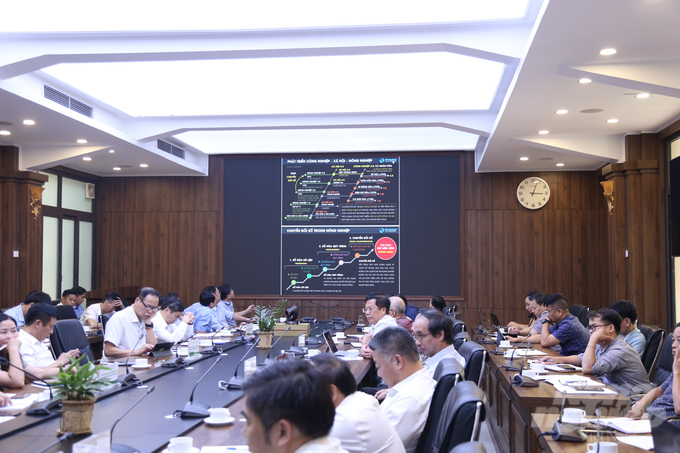
43/51 digital transformation goals implemented in the agricultural sector have achieved results in the first nine months of 2023.
One of the key tasks assigned to implementing units is to build digital data in the agricultural sector. The units have implemented 16/20 contents. Representative of the Department of Livestock Production says that they have developed data on concentrated livestock production areas, animal feed data, and completed the database system to serve the issuance and management of livestock facility identification codes for online farming. There have been 400 animal feed factories nationwide registering accounts and updating data.
Part of the 10-year (from 2012 to present) historical database on animal feed has been updated to the system. MARD units are continuing to dissect and update the system thoroughly shortly.
In the field of aquaculture, MARD is deploying and developing data on concentrated raw material areas and seafood supply associated with geographical indications in the fisheries sector. The database system to serve the level of Online code management is being researched and implemented. It will have a Steering Committee report on specific results at the end of the year.
Preside over the development of the forestry industry management information system database and complete the report proposing the Project to enhance the application of information technology and digital transformation in the forestry industry, implementing and focusing on the FORMIS system to serve executive direction, moving towards integration with industry databases.
Preside over the development of a database platform in the fields of quality management, food safety, processing associated with connecting supply and demand, and traceability to serve the domestic and export markets; research organization to build necessary modules to support the information system and database for export aquatic food safety management.
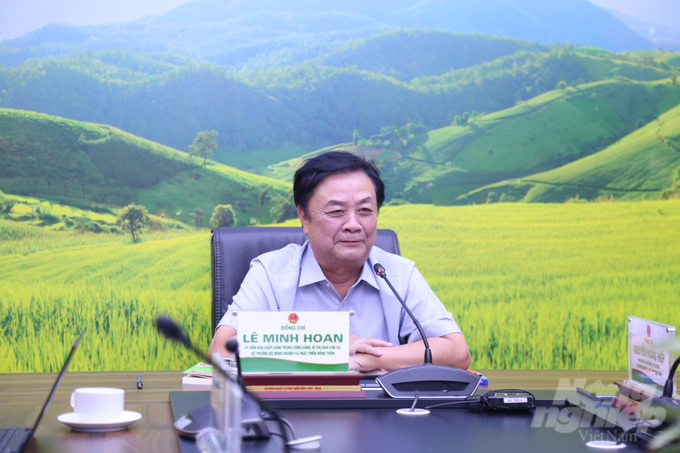
Minister Le Minh Hoan requests that leaders of units have a clear understanding of the concepts and goals of digital transformation to do it correctly, successfully and effectively.
Lead the development and completion of big data on harmful plant organisms. Database software for managing harmful organism data (SVGH) on crops in 63 provinces nationwide of the Plant Protection Department helps to accurately and thoroughly report the situation, forecasting the emergence of SVGH to direct prevention and control nationwide proactively; Advise the Ministry on direction when dangerous pests are likely to break out and cause widespread harm.
Continue to update data and maintain the operation of the Vietnam Natural Disaster Monitoring System (VNDMS) to serve the direction and management of natural disasters. Preside over research and development of online maps to support drought and saltwater intrusion management; Build and complete the database of assets and structures of irrigation works.
Between 2023 and 2024, the Irrigation Department will build an online map to support the management of drought and saltwater intrusion; Build and complete the database of assets and structures of irrigation works; Database to support effective operation of irrigation systems serving irrigation and water supply for production; digital transformation, connection and sharing of data on planning activities and water resources between levels, ministries, branches and localities, serving effective management of water resources, thereby maximizing exploitation benefits of water sources, minimizing damage caused.
Deputy Minister Nguyen Hoang Hiep asks the units to report on the content they are working on and propose problems or challenges at any stage. MARD’s ultimate goal is to achieve set goals and build a standard data architecture.
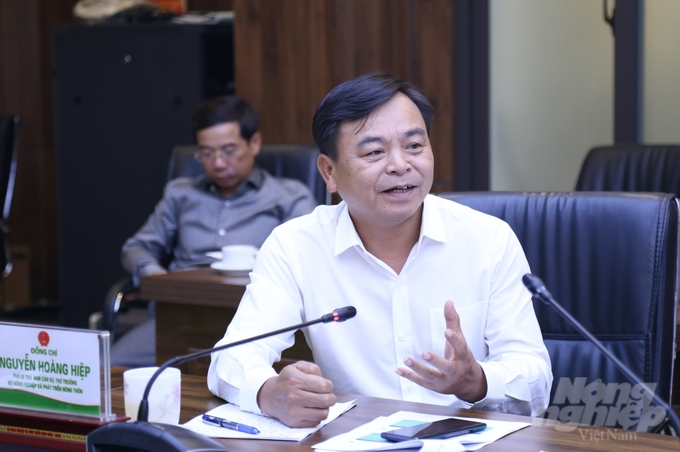
Deputy Minister Nguyen Hoang Hiep says: “The Ministry’s digital transformation ranking is not for competition, but an evaluation to know where we are and our weaknesses.”
“The departments deployed their tasks quite slowly, and there were little final results. The current weakness is institutions, human resources and digital transformation activities. There are data architectures that are very difficult to build, but some are not that difficult at all.”
Mr. Le Duc Thinh, Director of the Department of Economic Cooperation and Rural Development, states the difficulties in building a data architecture stem from abundant information about industries and craft villages. At the same time, MARD has few data management personnel. There are also weaknesses and incompatibilities in mechanical infrastructure and transmission lines.
The Forestry Department proposes to include the goal of increasing the application of information technology in the medium-term plan to purchase equipment to serve the task of digital transformation. The Department of Irrigation recommends strengthening information security when data is digitized, especially information about national safety and security.
The Department of Irrigation has built a database of irrigation reservoir systems; transmission system for flow, flood and drought forecasts, automatic synchronization into reports; a database of irrigation works and maintenance planning. Currently, the Department of Irrigation is coordinating the implement of several international projects, such as building a database on the Ma River system. This will be used as an example to create a database for the river basin system.
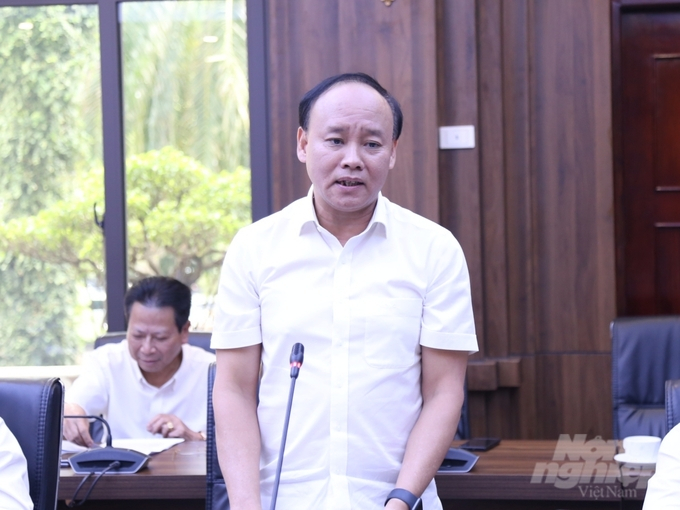
The Department of Irrigation proposes strengthening information security in national safety and security.
Deputy Minister Nguyen Hoang Hiep assesses that certain work has been completed in the digital transformation. However, there are still many things that have not been implemented. “MARD’s digital transformation ranks 15th out of 17 ministries. This ranking is not an indication of competition but an evaluation to know where we are and our weaknesses. MARD recommends that units and departments implement the assigned tasks. Whatever is lacking, you ought to implement it. There are currently two contents rated 6-7 (Digital awareness index and Digital infrastructure). The contents we are currently working on will have results by the end of this year. Building a data architecture system is like building a house, requiring drawings. Units must directly build their own data architecture platform, which must be completed by the end of 2023.”
Minister Le Minh Hoan requests that leaders of units have a clear understanding of the concepts and goals of digital transformation to do it correctly, successfully and effectively.
“Digital transformation is thinking, not digitizing (physical) data. The ultimate goal is to convert numbers and data into better management. You need to consider digital transformation as a goal, a mission, not a pressure. It would help if you used digital transformation to better manage the machine. Once you identify the goal, you will be able to simplify the data and see how we will go and where we will go without arbitrary. We will divide the roadmap into smaller pieces and have a specific plan with clear steps, otherwise, it will be very vague,” Minister Le Minh Hoan requests.
Translated by Quynh Chi

(VAN) Vaccinating juvenile pangasius helps reduce disease, antibiotic use, and farming costs, increasing profits for export-oriented farmers in An Giang.

(VAN) Due to a limited supply of workforce and competitive recruitment requirements, businesses struggle to retain talented veterinary human resources.

(VAN) WOAH’s guidance aims to mitigate disease risks through a One Health approach that balances economic, conservation, and public health interests.

(VAN) Ms. Nguyen Thi Dung, Deputy Director of Ngoc Hoang Cooperative, shared about the journey of bringing dragon fruit to Europe, achieving annual revenues in the billions of VND.

(VAN) Bamboo products from Thang Tho Bamboo Cooperative have reached many countries around the world, while also creating jobs for local workers.

(VAN) The Management Board of Con Dao National Park reported that a green sea turtle, tagged in the Philippines, has traveled thousands of kilometers to lay 84 eggs on Bay Canh Islet.

(VAN) Green technology is paving a new path for sustainable aquaculture in the Mekong Delta in particular and across the country in general, helping reduce emissions and adapt to climate change.